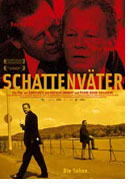

Opening 10 Nov 2005
Directed by:
Doris Metz
Writing credits:
Doris Metz
Willy Brandt resigned as German chancellor on May 7, 1974, due to his personal aide, Günther Guillaume, and his wife, Christel, being arrested for espionage. This event marked the fall of post-Germany’s first Nobel Peace prize recipient and social-democrat chancellor as well as the fall of two successful East German spies living in Bonn for 17 years. In the wreckage of these careers stood their sons Mathias Brandt and Pierre Guillaume, then 12 and 17 years old, respectively. Mathias became an actor and Pierre a photo journalist and author. In this documentary, film director Doris Metz accompanies Mathias Brandt to his old home in Bonn (“this is where the pool used to be, my father was a terrible swimmer; this is the garden where my father crashed his bicycle when bike riding with a Bavarian politician; this is the closet where we kept all the casting rods that the boot-lickers sent my father as presents, thinking he liked to fish”). She accompanies Pierre to his old apartment in East Germany where he moved to live alone. Party members watched over him. For years he waited for his father to discuss the events which led to his arrest; this discussion never came. The final break occurred when Pierre, his wife and two children crossed the border into the West just a year before the wall fell and took on his mother’s maiden name of Boom. Both boys identified with their mothers: Pierre visited his mother regularly in her Cologne jail before both parents were exchanged into East Germany where they divorced. Mathias said, “It’s is amazing how smoothly my father got rid of my mother when her usefulness was over.”
The topic is fascinating of two men growing up in the “shadows” or Schatten of their fathers. Mathias Brandt said, “Others summed me up in relation to a man who was a stranger to me; how could I know myself, if I didn’t know him?” Sadly, photographer Sophie Maintigneux should have made an art film about architecture, considering the time we wasted watching stone walls, train tracks, and buildings. This, as well as the grating music (Markus Stockhausen is in love with his own trumpeting) makes watching the film difficult for anyone who isn’t dedicated to the topic, which is too bad, because it is a disservice to two interesting men, now in their forties. (Becky Tan)